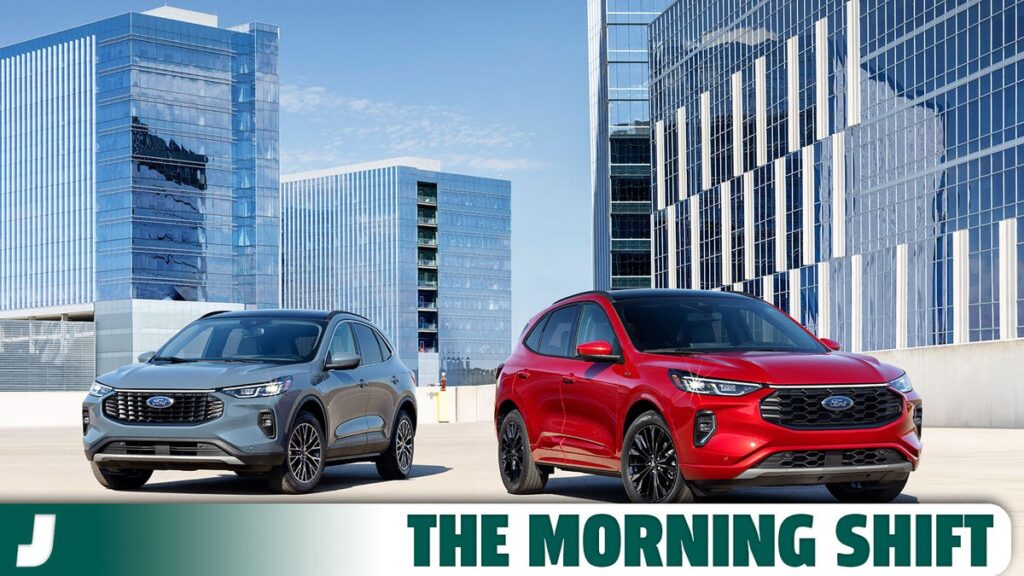Ford Is Killing Off More Gas Cars To Make Room For EVs

Good morning! It’s Thursday, August 31, 2023, and this is The Morning Shift, your daily roundup of the top automotive headlines from around the world, in one place. Here are the important stories you need to know today.
Tesla Model 3 Is Now Cheaper Than the Average New Car
1st Gear: Ford Kills The Edge, Escape And Transit Connect
Almost every automaker around the world is rushing to bring in new, battery-powered models to replace their aging range of gas-powered cars. Volvo has the EX90 as its new flagship SUV, Fiat is bringing the 500 back to America as an electric city car and Ford is planning a whole fleet of new EVs to hit our streets in the coming years.
But in order to make space for its shiny new electric cars, Ford will kill off the Edge, Escape, and Transit Connect models here in America. According to a new report from The Street, Ford is planning to can the three models at the end of 2023. The site reports:
In March 2023, Ford F said it would discontinue the Transit Connect ICE vehicle in North America at the end of 2023, Automotive News reported, and the company has since added the Escape and Edge ICE vehicles to its list of discontinued vehicles at the end of this year.
Ford’s Fiesta already made its exit in Europe this year. With these vehicles disappearing, Ford plans to produce more EVs in its transition to all-electric.
With its F-150 Lightning, Mustang Mach E and E Transit models, Ford previously rose to the lofty height of being America’s second-best-selling EV manufacturer, behind Tesla. However, as GM expanded its own lineup of EVs, the Blue Oval dropped to third.
To try and take the fight back to Tesla and General Motors, Ford has a fleet of new EVs up its sleeves. First, there’s set to be a new Explorer that’s being developed by Ford and VW for Europe. Ford is also followed everywhere it goes by rumors of an electric Bronco and even an electric Fiesta.
2nd Gear: The Most Stolen Cars In America
We’ve all heard the drama about Hyundai and Kia models that were too easy to steal, it’s left the companies caught up in court while they try to settle with motorists that had their models stolen. But while there was a spate of thefts for the Korean automakers when people realized they didn’t have immobilizers installed, they aren’t actually the most stolen car in America.
Instead, the title of America’s most stolen car actually goes to the Dodge Charger, according to a new report from Automotive News. The report ranked models on the number of thefts per 1,000 models out on the road, with the standings being topped by the Dodge Charger SRT Hellcat. The site reports:
The Charger SRT Hellcat was joined by another Dodge model, the Charger Hemi, at the top of the list of vehicles most likely to be stolen relative to their numbers on the road. The Charger Hemi is more than 20 times as likely to be stolen compared with the average vehicle, the study found.
The Infiniti Q50, Dodge Challenger and four-wheel-drive Land Rover Range Rover rounded out the top 5 vehicles most likely to be stolen. The Q50 has been a recurring name on the list since the 2014 model year “for reasons that remain a mystery,” according to the institute.
Surprisingly, despite all the bad press Kia and Hyundai cars have received in recent months, only the Kia Sportage made the top 10, with the 4WD model placing 8th and the standard Sportage was 6th.
According to the report, the two least stolen cars in America are the Tesla Model 3 4WD and the Tesla Model Y 4WD.
3rd Gear: DOJ Investigates Tesla
And speaking of Tesla, the electric car company is under investigation yet again, but this time it’s not to do with its controversial Autopilot driver assist system. Instead, the company is facing an inquiry from the U.S. Department of Justice and the Securities and Exchange Commission over its spending habits.
According to a report from the Wall Street Journal, Tesla is under investigation on a project that was “described internally as a house for Chief Executive Elon Musk.” The project has now caught the attention of the SEC, DOJ and the U.S. Attorney’s Office for the Southern District of New York, which is asking Tesla for information about personal benefits it paid to Musk and how much Tesla spent on the glass house project. The WSJ reports:
The Wall Street Journal was the first to report in July that Tesla board members had investigated whether company resources were misused on the secret effort, known internally as “Project 42,” and whether Musk was personally involved. The outcome of Tesla’s internal investigation couldn’t be learned.
The Securities and Exchange Commission has also opened a civil investigation into Project 42 and is seeking similar information from the company, one of the people said.
In its various design stages, the glass house reportedly took “the shape of a twisted hexagon.” The WSJ says that at a later date, it also appeared to look like a massive glass box that included a residential area.
The project even sparked concern from Tesla insiders, with lawyers and board members scrutinizing the project and the millions the company had spent on glass for it. The WSJ reports that the “status of the project and whether the glass was ever delivered to Tesla couldn’t be learned.”
4th Gear: Polestar Narrows Losses
It’s a tough time to be a fledgling car company, as EV makers are springing up left, right, and center and fighting for our attention. One bright star in the mess is Polestar, which just posted its latest financial results and they aren’t as negative as it feared.
According to Reuters, the company’s second-quarter losses narrowed slightly as it struggled through the kinds of supply chain issues that remain prevalent across the industry following the Covid-19 pandemic and Russia’s invasion of Ukraine. Reuters reports:
The cash-strapped Swedish carmaker, founded by China’s Geely and Volvo Cars, posted an operating loss on Thursday of $274.4 million, down from $627.3 million a year ago, while revenue rose to $685.2 million from $589.1 million.
Polestar said it had delivered 15,765 vehicles during the second quarter, and reiterated its forecast of delivering between 60,000 and 70,000 cars in 2023.
That target of 60,000 to 70,000 cars sold by the company this year is actually down on its earlier prediction, which called for sales of up to 80,000 models this year. Polestar has been forced to temper its expectations while it competes against startups from China, such as BYD, as well as established automakers moving into the EV space, such as Ford, Stellantis, and GM.


